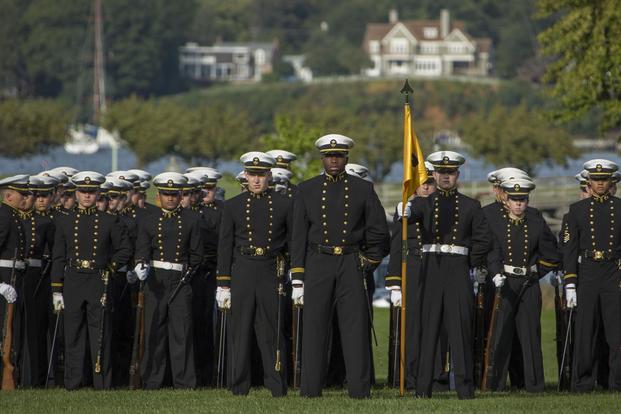This article originally appeared on the U.S. Naval Institute blog.
Formal parades are consistently a point of contention between midshipmen past and present. Every year, midshipmen grumble and complain about marching through muggy Annapolis afternoons, and every year, alumni push back with grandiose claims of tradition, military discipline, and professionalism. While there is merit to both sides, it doesn't hurt to ask: whining and complaining aside, exactly what is the point of parades?
The answer varies depending on who you ask; motivated grads will tell you that parades build character and instill the discipline "required" to succeed in combat, while more sympathetic voices concede that, while parades are useless for officer development, at least they make money for the school. Please, let's cut the charades. It's a stretch to assume that standing in a field for 90 minutes magically develops the mental fortitude to endure the hardships of combat, and last I heard, there isn't collection hat going around the stands. No. A parade is nothing more than an exercise in mindlessness and blind obedience that takes away time from more productive endeavors such as homework or physical fitness. A common piece of advice midshipmen give to each other before parades is to "turn your brain off" for the next hour and a half. Not exactly the sort of sentiment American taxpayers like to hear from future officers in the Navy and Marine Corps.
Unfortunately, despite their obvious lack of training value, the Naval Academy continues to clutch parades close to its chest. The USNA official website boasts that parades "have been a part of Naval Academy training since its establishment in 1845." Ok... and? Longevity does not justify bad practice. It is naive to assume that something is inherently valuable simply because it's tradition. Putting on the literal, and figurative, costume of the past has nothing to do with training the next generation of warfighters.
Don't worry, I heard the collective thud of salt crusted rings slamming down in indignation, and the accompanying cacophony of laments. "The Naval Academy has gotten soft." "Back in my time .... " "Well I had to do it, so should they." Unfortunately, the Naval Academy has a problem with trying to squeeze as much juice as it can out of the past, rather than looking forward to fresh possibilities of the future. The Navy and Marine Corps of the 21st century need proactive leaders who can think critically and who are constantly buzzing to the next project. What the military does not need are leaders who sit still and wait for someone to tell them what to do--which is exactly the mentality parades condition.
Again, again, please simmer down. I hear your concerns. This question comes to us from Richard Bob Smith VII, Class of '79, "Well if we get rid of parades, what will we put in their place?" Great question sir, and to that I answer: nothing. Replacing parades with another mandatory event concocted by the USNA defeats the purpose of scratching parades in the first place. The Naval Academy seems to have this weird assumption that enduring inefficient processes and unnecessarily long briefs (that could have been an email) is somehow good for the development of a Navy or Marine Corps officer. It's not. In fact, it's counterproductive to the Naval Academy's mission of developing midshipmen "morally, mentally, and physically." As mentioned before, in a place where time is already scarce, those extra hours could be used to study, workout, or even catch up on much needed sleep. As an anonymous Niche user wrote about the Naval Academy, "There's a large amount of frustration derived from the fact that, despite being entrusted with the lives of your sailors and marines immediately following graduation, it seems the administration hardly trusts you to lead most parts of your own life."
On the other hand, I understand that experiences like marching in parades are what make the Naval Academy unique, justifying millions of dollars in congressional spending. Without parades or other assorted activities, would the Naval Academy still be worth the taxpayer dollar? The simple answer is yes. Smart, driven young men and women who are willing to serve their country deserve an institution like the Naval Academy. Especially in today's conversation of opportunity inequality, the USNA is increasingly relevant. A free college degree in exchange for service to country epitomizes the quintessential American maxim that success comes to those who work hard. Yet, at the same time, these men and women also deserve an institution that will prepare them for the battlefields of the 21st century. Like the rest of our country, the Naval Academy needs to focus less on trying to live up to the glory of the past, and instead look towards how we can be the best in the future. Ending parades is a great place to start.
-- The opinions expressed in this op-ed are those of the author and do not necessarily reflect the views of Military.com. If you would like to submit your own commentary, please send your article to opinions@military.com for consideration.














